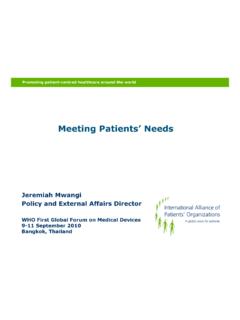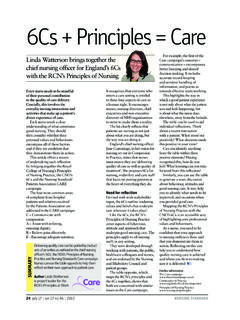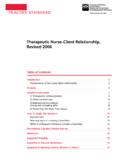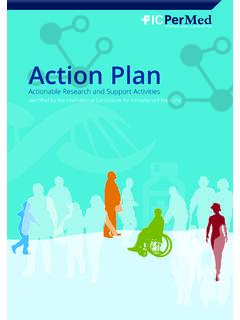Transcription of Interprofessional Education & Core Competencies
1 Learning to work together, working to learn together apprendre collaborer, collaborer pour apprendre Interprofessional Education &. core Competencies LITERATURE REVIEW. CIHC is a 2-year initiative funded by Health Canada Le CPIS est une initiative d'une dur e de deux ans financ e par Sant Canada 2 W. The Canadian Interprofessional Health Collaborative (CIHC) is made up of health organizations, health educators, researchers, health professionals, and students from across Canada. We believe Interprofessional Education and collaborative patient-centred practice are key to building effective health care teams and improving the experience and outcomes of patients. The CIHC identifies and shares best practices and its extensive and growing knowledge in Interprofessional Education and collaborative practice. Canadian Interprofessional Health Collaborative College of Health Disciplines University of British Columbia Vancouver BC V6T 1Z3 Canada Interprofessional Education & core Competencies .
2 Literature Review 3 W. Acknowledgements In March 2007, the CIHC Curricula Committee commissioned an updated synthesis of IPE. competency literature and statements, and identification of continuing gaps in research and literature related to IPE Competencies . This literature review is a compilation from the published and grey literature that was available at the time of the review. There are likely other sources that the author was unable to access during the timeline. In preparation of this document, the CIHC acknowledges Karen Thadani, the researcher contracted to complete the project. Susanna Gilbert of Descriptions Design & Planning formatted this document. Karen Thadani would like to give special thanks to Dr. Carole Orchard for her guidance and advice with data collection and analysis. Thanks to Andrea Hilchie-Pye, project manager IECPCP.
3 At Cancer Care Nova Scotia and Linda Ferguson RN PhD, professor, college of nursing at the University of Saskatchewan, for their help with data collection. Vernon Curran CIHC Curricula Committee Co-Chair Carole Orchard CIHC Curricula Committee Co-Chair June 6, 2007. Interprofessional Education & core Competencies . Literature Review 4 W. Table of Contents Acknowledgements .. 3. Interprofessional Education (IPE).. 5. IPE Around the World .. 6. Operational Definition: IPE .. 8. What is Competency? .. 9. core Table 1: core Universities Implementing IPE ..13. Table 2: Universities Adopting core Competencies ..13. core Competencies : Similarities & Table 3: Evidence in the Literature: Similarities of core Competencies ..14. Interprofessional Education & core Competencies . Literature Review 5 W. Interprofessional Education (IPE). Interprofessional Education (IPE) is not a new concept for researchers and professionals in the health care sector.
4 However, after conducting a comprehensive review of the literature pertaining to IPE, it became clear that among the proponents of IPE initiatives, there is a lack of clarity surrounding the concept of IPE. There were several definitions of IPE that span disciplines and geographic locations. Although there may have been overlap in the terminology used to define IPE, in many instances terms were used interchangeably. For example, terms such as team-approach' and collaboratively' were used in some definitions while other definitions used, multi-disciplinary' and group-based.' While there were frequent interchanging of terms, their meanings varied in interpretation both within' and across' health care In order to attempt to create a common language throughout this paper, operational definitions will be used for the sake of clarity and continuity.
5 The term within' will refer to one discipline, for example nursing,' whereas the term across' will refer to multiple disciplines. Interprofessional Education & core Competencies . Literature Review 6 W. IPE Around the World According to The World Health Organization (WHO), IPE is the process by which a group of students or workers from the health-related occupations with different backgrounds learn together during certain periods of their Education , with interaction as the important goal, to collaborate in providing promotive, preventive, curative, rehabilitative, and other health-related services. 2. The Center for the Advancement of Interprofessional Education (CAIPE) defines IPE as, two or more professions learn with, from and about each other to improve collaboration and the quality of care. 3. In the United Kingdom, IPE is being used as a vehicle to drive health care-related policy goals.
6 For example, there is a plan within National Health Service (NHS) in the Department of Health (DOH) that is requesting the creation of a single program for all health care professionals. The goal of the program is to lay a foundation to provide students and staff with the resources they need to be able to change career paths with ease. This initiative will also promote collaboration, team work, and creation of new working atmospheres. 4. Other international organizations including Organization for Economic Co-operation and Development (OECD) and the World Federation of Medical Education (WFME) have embraced strategies that foster experiences in IPE. 5. According to Health Canada, changing the way we educate health providers is key to achieving system change and to ensuring that health providers have the necessary knowledge and training to work effectively on Interprofessional teams within the evolving health care system.
7 6 The goals, which are listed on the government's web site include: W Socializing health care providers in working together, in shared problem solving and decision making, towards enhancing the benefit for patients, and other recipients of services;. W Developing mutual understanding of, and respect for, the contributions of various disciplines; and W Instilling the requisite Competencies for collaborative practice. 6. The Canadian government has furthered the concept of IPE to include the patient in their outline of collaboration in the health care sector. Appropriately termed Interprofessional Education for Collaborative Patient-Centred Practice (IECPCP),' is described as a method of learning together to promote collaboration. IECPCP initiatives will facilitate the implementation of Interprofessional Education (IE) for collaborative patient-centred practice.
8 Overall, the goals of IECPCP are to improve patient and provider satisfaction and improve patient outcomes. 6. Interprofessional Education & core Competencies . Literature Review 7 W. According to the Interprofessional Education Consortium (IPEC), a funded group of educators, administrators, and evaluators from the United States, IPE is a holistic concept and is defined as a learning process that prepares professionals through interdisciplinary Education and diverse fieldwork experiences to work collaboratively with communities to meet the multifaceted needs of children, youth, and families. It provides the knowledge, skills, and values individuals need to collaborate effectively with others as they serve communities and families. 7. D'amour et al defined the term interprofessionality' in the health domain as the development of a cohesive practice between professionals from different disciplines.
9 It is the process by which professionals reflect on and develop ways of practicing that provides an integrated and cohesive answer to the needs of the client/family/population. 8. Another definition of IPE that appeared in the Journal of Interprofessional care is, Students from various professions learn together as a team. Their collaborative interaction is characterized by the integration and modification of different professions' contributions in light of input from other professions. 9. During an extensive review of the literature related to IPE, it became clear that there were several closely related terms that organizations, such as Education institutions, specific health care sectors, researchers and professionals use in order to define or expand on the concept of IPE. It is necessary to explore some of the terms. They include: C OLL ABORATI VE P ATIE NT -CE NTERE D PR ACT ICE is designed to promote the active participation of each discipline in patient care.
10 It enhances patient and family-centred goals and values, provides mechanisms for continuous communication among caregivers, and optimizes staff participation in clinical decision making within and across disciplines fostering respect for disciplinary contributions of all professionals." 10. COLLABORATION IN HE AL TH CARE TE AMS is "an Interprofessional process of communication and decision making that enables the separate and shared knowledge and skills of health care providers to synergistically influence the client/patient care provided. 11. E DU C AT I ON A L CON T I N UU M is the movement through the continuum that allows for increased complex knowledge and appreciation of other Definitions of terms relating to IPE have been born based on previous Education , geographic location, and discipline. For example, Watkins et al describe teamwork and its relationship with collaboration as, the interaction or relationship of two or more health professionals who work interdependently to provide care for patients.










